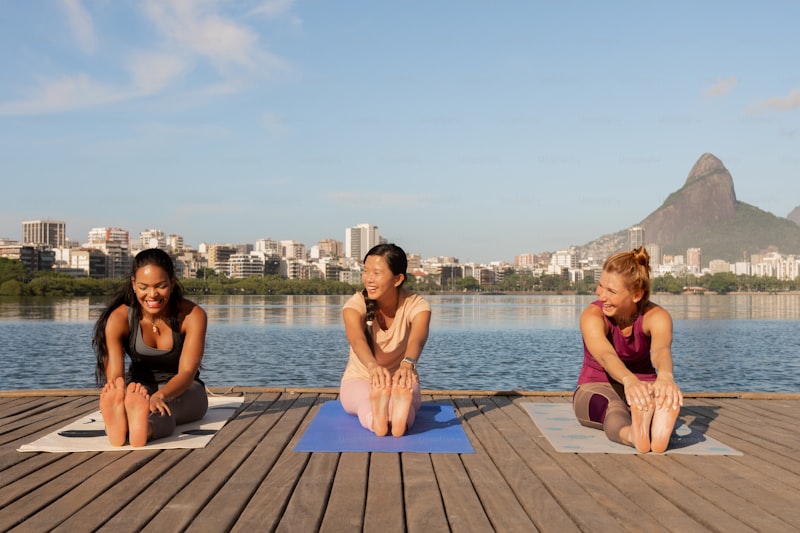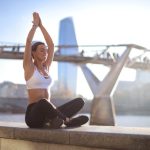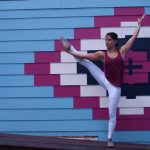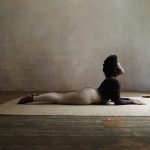YogaLondon is 10 this November. We talk to our Director and Founder Rebecca Ffrench about what she’s most proud of, the birth of YogaLondon, why she’s moving away from Yoga Philosophy to learn Flamenco and cheese-making…and why YogaLondon’s courses should come with a ‘THIS WILL CHANGE YOUR LIFE’ warning!
1. Firstly, congratulations on YogaLondon’s tenth anniversary! What are you most proud of?
I think I’m most proud of how it exists as its own thing. In the beginning we were doing everything ourselves, and now it’s a school with a full faculty and all of these people who make a living with us, hundreds of students, thousands of graduates… That’s kind of mind-blowing.
I’m also so proud of all the people and what they do, it’s quite astonishing – so let’s do another ten years and make it to twenty.
2. Tell us how YogaLondon first started.
I was your classic overworked yoga teacher in London. I was running around teaching all over the place – the upshot was that I managed to gain a lot of teaching experience really quickly. After a while, students started to ask me about teacher training and I would point them in the direction of places they could do it, but they kept saying ‘why can’t you do it?’ When I looked into it I found that I actually could!
It took about two years to create YogaLondon, because there was a lot of groundwork that needed to be done before we could open up to real-life students. So it was really my original students who planted the seed of YogaLondon.
3. How did the name YogaLondon come about?
For my co-founder Edward Serrano and I, the name wasn’t that important, we just wanted to get on with doing the yoga teacher training.
We sat down over a cuppa and just decided on a name. But it’s interesting how it did work for us. And after ten years I really identify with our name. The whole premise behind the school was that it was non-dogmatic, so we didn’t want to use Sanskrit or anything aligned to any one traditional yoga methodology, or anything too airy-fairy or jazzy. It’s just right.
4. What would you like YogaLondon’s legacy to be?
I don’t think I’m very ambitious because I think I already see what I want from it. On the one hand we offer what I hope are robust, good, professional teacher training courses. On the other hand, and what’s really important, is that it’s one of the only times that people get to spend a really good amount of time focused on themselves.
Although our courses should perhaps come with a warning, as people get divorced, or leave their jobs that they were very successful at, and make HUGE life decisions…. It gives them that time to work out what they really want from life. It’s not like the teachers do something on purpose. It’s yoga magic that works on its own!
5. How does your yoga feed into the business of running a yoga business?
The interesting yogic concept that comes up for me in terms of the business, isn’t an obvious one like ahimsa, but it’s actually saucha or cleanliness. When you have things very clean and transparent, that works because there’s a clean system, so that everyone on every level is on a level-playing field.
6. What are the pros and cons of having a dance background as a yoga teacher?
Just because someone’s from a dance background doesn’t make it easy and half of the yoga stuff is in your head anyway. When you’re approaching a posture, everyone, no matter how ‘good’ they are, is thinking they need to do it better. Even if someone can get both their legs behind their head, they want to get them further or stand on their hands – there isn’t an endpoint.
In fact, dancers might not find it physically easier. I started dancing when I was three years old and then danced professionally, but I have a really stiff back – I’m not very good at backbends. But then again, one thing dancers do have is discipline.
7. You seem to be quite a disciplined person. How do you maintain that?
I’m actually really habitual as a person. I have two cups of coffee in the morning – it never varies, and they are always exactly the same. I’m like clockwork. In fact, everything gets thrown off if I don’t do my routine. Self-discipline for me is doing things that aren’t in my habitual mode.
My yoga practice is the same. I do a modified Ashtanga practice every morning, which I do all the time and never vary it. But even though the practice is the same, I’m not – the day isn’t, the world isn’t. So even though I’m just doing a sun salutation, it’s always slightly different, and that’s different enough for me.
8. You’ve said that teaching yoga teachers is your dharma – do you get to teach much any more?
I don’t do any teaching now and I haven’t done it for many years. And I miss it because when you’re in the room with the students there’s an instant feedback loop, you can engage with people, and the questions they asked were such a driver for my own learning.
Now I’m more like the Headmistress looking after the running of the school. And you don’t get the same feedback loop with yoga emails. Being a yoga teacher trainer is the best job ever, it’s so enriching and nourishing.
9. Talking of being in the room, how has lockdown affected YogaLondon?
This year has been a massive challenge for the school. During the first lockdown, we had to adapt and move everything online. One of the challenges is that yes, you can translate a yoga class online, but I’m a firm believer that you can’t learn how to be a yoga teacher online.
I’m very proud that, despite the limitations on being together as a group over a lot of this year, all of our students were still able to graduate using a blended system of online and in-person teaching. We were also more prepared for the second lockdown and have been able to stay open for in-person teaching this time around, which has been wonderful.
10. What will YogaLondon take away from 2020?
Now we’re reaching a point where we can reflect on the year it hasn’t been all terrible.
We’re alive and kicking, and the great thing is we know we’ll be able to stay open and deliver in-person courses should there be any future lockdowns.
When I look back, we’ve also launched lots of new courses – we’ve started the MBSR training and the Yoga Nidra training – so despite all of the stumbles, there has been really great progress.
There’s no doubt the pandemic has changed the yoga scene, and it has definitely changed the skills that a yoga teacher needs.
So now we need to look into how do you teach online, how do you engage those students, how do you correct them, what about that health and safety aspect? So we’ve started to update our syllabus to reflect what is a permanent change.
11. You have two Masters in the Philosophy of Yoga – what are you looking to learn next?
Actually, I’m taking up flamenco next week! And I’m thinking about doing a cheese-making course soon – watch this space. But yes, I spent time doing a couple of degrees because yoga philosophy is my bag and I loved diving deeply into it.
However, by the end of it, I realised I needed to take a step back from academic learning. Yoga philosophy can’t just be in your head, in a library writing essays. It needs to be balanced with practical assimilation and activities using those thoughts and ideas.
So I’m looking more into physical practices like mindfulness meditation, and trying to go the other way a bit.
12. Behind you is a floor to ceiling collection of yoga books [and apparently there’s more]. Could you pick your top three books from your library?
My favourite is this fab 60’s, trippy book full of drawings, called Be Here Now by Ram Dass (who recently died). I really love the beautiful simplicity he brings to it.
Then Yoga Philosophy of Patanjali by Swami Hariharananda, because it has a fantastic commentary on the yoga sutras.
Lastly, the very first yoga book I ever bought, Ashtanga Yoga: The Practice Manual by David Swenson which I bought in 1999. It’s been very well loved over the years. We still use it as the text for the 200-hour yoga teacher training. We ❤ David.
13. Cultural appropriation has really come to the fore this year. As a western yoga school, how do you honour and appreciate yoga’s cultural heritage, rather than ransack it?
I think it’s brought the topic to the fore in the yoga community, which is definitely long overdue. We’re doing lots of work at the moment with a Diversity and Equity adviser and drawing up an action plan for next year.
It’s thinking about how to appreciate, uphold, honour and say ‘yes, this is amazing’, without just ransacking it. But equally, how do we allow something new to develop and grow over time.
When you study yoga, you discover that it’s not one fixed thing and that it’s constantly changing. It has developed, changed, and grown over time. It’s an evolving practice – a living thing. The danger is that if you try to fix yoga as just one thing, it stops being yoga. And there’s no doubt that transnational western yoga is a thing – different to traditional yoga forms in India.
14. You’re a self-proclaimed cheese obsessive. So, tell us your favourite cheese.
There’s a cheese called Delice de Borgogne which they sell at Wholefoods, which is a triple cream soft cheese – like brie but about a million times creamier. It is beyond ridiculously good.
But I love all cheese. I don’t have a sweet tooth at all, but I definitely have a cheese tooth – it’s my comfort food, my cheer-me-up food, my I’ve done well food, my breakfast food – ALL FOOD.












